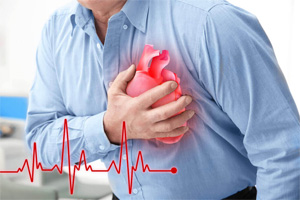- Home
- Editorial
- News
- Practice Guidelines
- Anesthesiology Guidelines
- Cancer Guidelines
- Cardiac Sciences Guidelines
- Critical Care Guidelines
- Dentistry Guidelines
- Dermatology Guidelines
- Diabetes and Endo Guidelines
- Diagnostics Guidelines
- ENT Guidelines
- Featured Practice Guidelines
- Gastroenterology Guidelines
- Geriatrics Guidelines
- Medicine Guidelines
- Nephrology Guidelines
- Neurosciences Guidelines
- Obs and Gynae Guidelines
- Ophthalmology Guidelines
- Orthopaedics Guidelines
- Paediatrics Guidelines
- Psychiatry Guidelines
- Pulmonology Guidelines
- Radiology Guidelines
- Surgery Guidelines
- Urology Guidelines
New drug in loop for treatment of heart attack and heart failure prevention

Canada: Researchers from the University of Guelph seems to have discovered a novel drug target involved in controlling the body's repair responses after a heart attack. This may pave the way for creating a potential drug for the treatment of heart attacks and prevention of heart failure - for which currently there exists no cure.
The paper by Prof. Tami Martino, Department of Biomedical Sciences, and PhD student Cristine Reitz, was published in the Nature Communications Biology journal. Martino's lab will now begin preclinical trials on a potential therapy.
A heart attack is a leading cause of death worldwide. It triggers inflammatory responses causing a scar formation in the heart which over time eventually leads to heart failure.
The potential drug when administered within hours of an attack could prevent scarring. It also eliminates the need for patients to possibly take debilitating heart medication for the rest of their lives.
"This research is really exciting because it opens the door to use circadian medicine therapies to heal heart attacks after they occur and to prevent the subsequent development of heart failure," said Martino, a pioneer in circadian medicine.
The circadian "clock" is found in virtually all cells of the body. It consists of genes and proteins that interact during the 24-hour day and night cycles to regulate key functions such as heart rate and blood pressure.
In the heart, that clock mechanism controls healthy cardiovascular physiology as well as how the heart responds to damage and undergoes repair.
The researchers used a drug called SR9009, which targets a key component of the cellular clock mechanism. The medication disrupts the expression of genes that trigger adverse immune responses after a heart attack.
In Martino's experiments with mice, the treatment reduced the production of a cellular sensor called the NLRP3 inflammasome that contributes to scarring. The U of G researchers showed for the first time that giving this treatment after a heart attack along with conventional therapy such as reperfusion led to less inflammation and better cardiac repair.
That allowed healing almost as though no heart attack had happened, said Martino, who is the director of U of G's Centre for Cardiovascular Investigations.
"No scar, no heart damage, no heart failure - people can survive heart attacks because the heart won't even be damaged. We were amazed to see how quickly it worked, and how effective it was at curing heart attacks and preventing heart failure in our mouse models of the disease."
The discovery might ultimately help in other heart therapies involving early adverse inflammatory response such as organ transplant or valve replacement, she added.
More generally, it may also help with profound adverse inflammatory responses, such as treatment of traumatic brain injury, strokes or severe burns, she said.
By studying how disruptions to body clock rhythms drive heart diseases, Martino, who is a mid-career investigator of the Heart and Stroke Foundation of Canada, aims to manipulate circadian biology with genetic, environmental or pharmacological therapies.
"What we are discovering, is that the circadian clock mechanism is important not just for heart health but also for how to heal from heart disease," said Martino, who is director of U of G's Centre for Cardiovascular Investigations.
"Circadian medicine is truly a promising new field that will lead to longer, healthier lives."
Dr Prem Aggarwal, (MD, DNB Medicine, DNB Cardiology) is a Cardiologist by profession and also the Co-founder of Medical Dialogues. He is the Chairman of Sanjeevan Hospital in Central Delhi and also serving as the member of Delhi Medical Council

Disclaimer: This site is primarily intended for healthcare professionals. Any content/information on this website does not replace the advice of medical and/or health professionals and should not be construed as medical/diagnostic advice/endorsement or prescription. Use of this site is subject to our terms of use, privacy policy, advertisement policy. © 2020 Minerva Medical Treatment Pvt Ltd